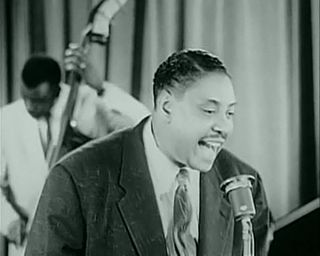
Funk is a music genre that originated in African-American communities in the mid-1960s when musicians created a rhythmic, danceable new form of music through a mixture of various music genres that were popular among African-Americans in the mid-20th century. It deemphasizes melody and chord progressions and focuses on a strong rhythmic groove of a bassline played by an electric bassist and a drum part played by a percussionist, often at slower tempos than other popular music. Funk typically consists of a complex percussive groove with rhythm instruments playing interlocking grooves that create a "hypnotic" and "danceable" feel. It uses the same richly colored extended chords found in bebop jazz, such as minor chords with added sevenths and elevenths, and dominant seventh chords with altered ninths and thirteenths.

Rhythm and blues, frequently abbreviated as R&B or R'n'B, is a genre of popular music that originated within African-American communities in the 1940s. The term was originally used by record companies to describe recordings marketed predominantly to African Americans, at a time when "rocking, jazz based music ... [with a] heavy, insistent beat" was becoming more popular. In the commercial rhythm and blues music typical of the 1950s through the 1970s, the bands usually consisted of a piano, one or two guitars, bass, drums, one or more saxophones, and sometimes background vocalists. R&B lyrical themes often encapsulate the African-American history and experience of pain and the quest for freedom and joy, as well as triumphs and failures in terms of societal racism, oppression, relationships, economics, and aspirations.
Chicago blues is a form of blues music that developed in Chicago, Illinois. It is based on earlier blues idioms, such as Delta blues, but is performed in an urban style. It developed alongside the Great Migration of African Americans of the first half of the twentieth century. Key features that distinguish Chicago blues from the earlier traditions, such as Delta blues, is the prominent use of electrified instruments, especially the electric guitar, and especially the use of electronic effects such as distortion and overdrive.
Jump blues is an up-tempo style of blues, jazz, and boogie woogie usually played by small groups and featuring horn instruments. It was popular in the 1940s and was a precursor of rhythm and blues and rock and roll. Appreciation of jump blues was renewed in the 1990s as part of the swing revival.

Fred Lincoln "Link" Wray Jr. was an American guitarist, songwriter, and vocalist who became popular in the late 1950s. His 1958 instrumental single "Rumble", reached the top 20 in the United States; and was one of the earliest songs in rock music to utilize distortion and tremolo.
Michael or Mike Turner may refer to:
Bob or Bobby James may refer to:
Robert, Rob, Bob, or Bobby Thomas may refer to:
Rick Roberts may refer to:
Robert, Bob or Bobby Drake may refer to:
Dance-rock is a dance-infused genre of rock music. It is a post-disco genre connected with pop rock and post-punk with fewer rhythm and blues influences. It originated in the early 1980s, following the decline in popularity of both punk and disco.
Dr. Feelgood may refer to:
Robert Johnston may refer to:
Robert Gardner may refer to:
Robert Nicholson may refer to:
Paul Roberts may refer to:
Kid, Kids, KIDS, and K.I.D.S. may refer to:
This page is based on this
Wikipedia article Text is available under the
CC BY-SA 4.0 license; additional terms may apply.
Images, videos and audio are available under their respective licenses.


